情态动词用法详解
图片预览

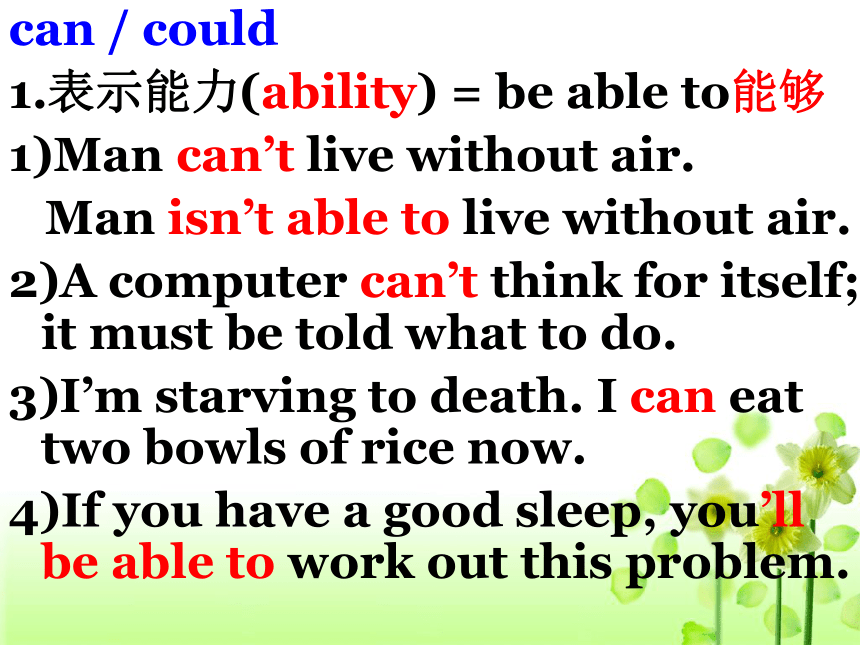
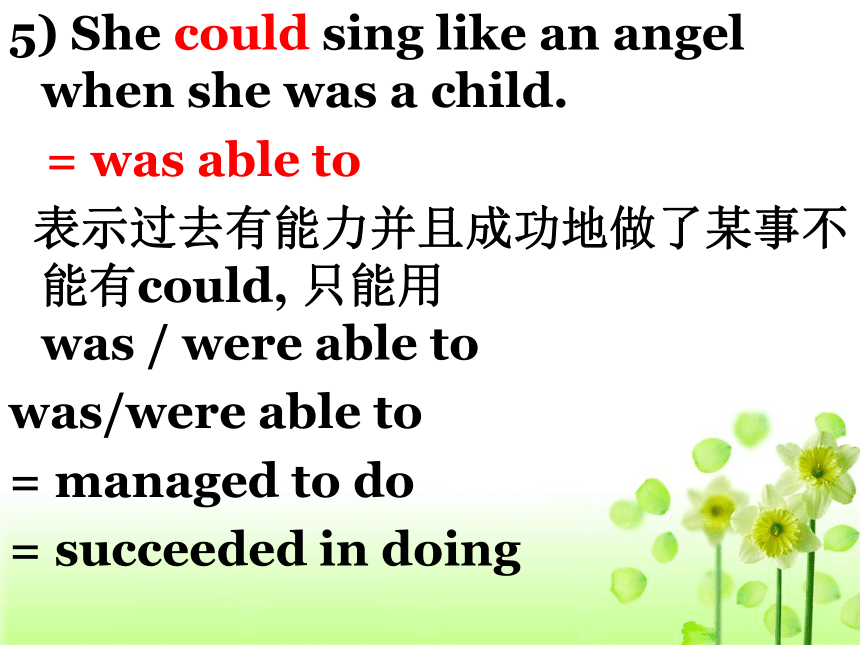
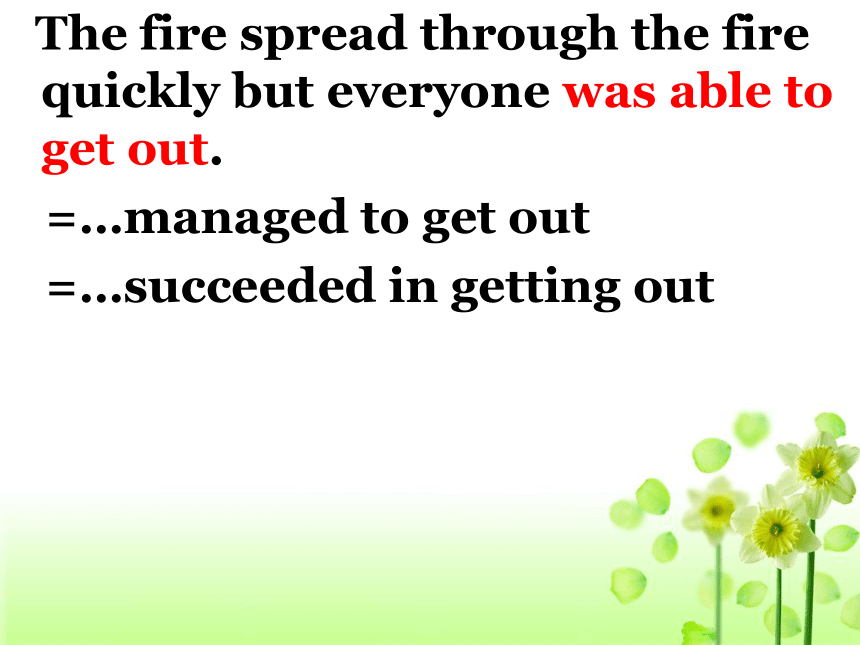


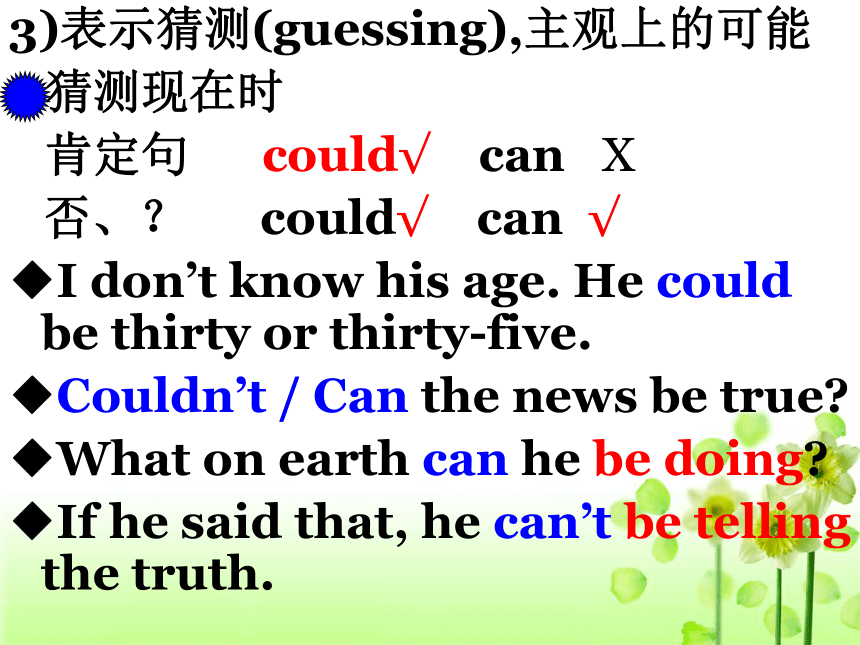
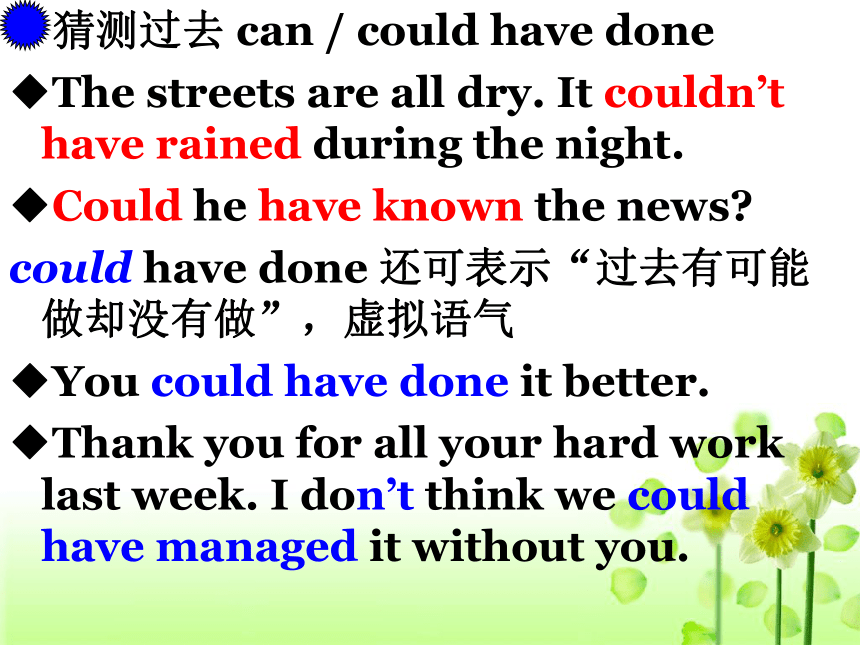
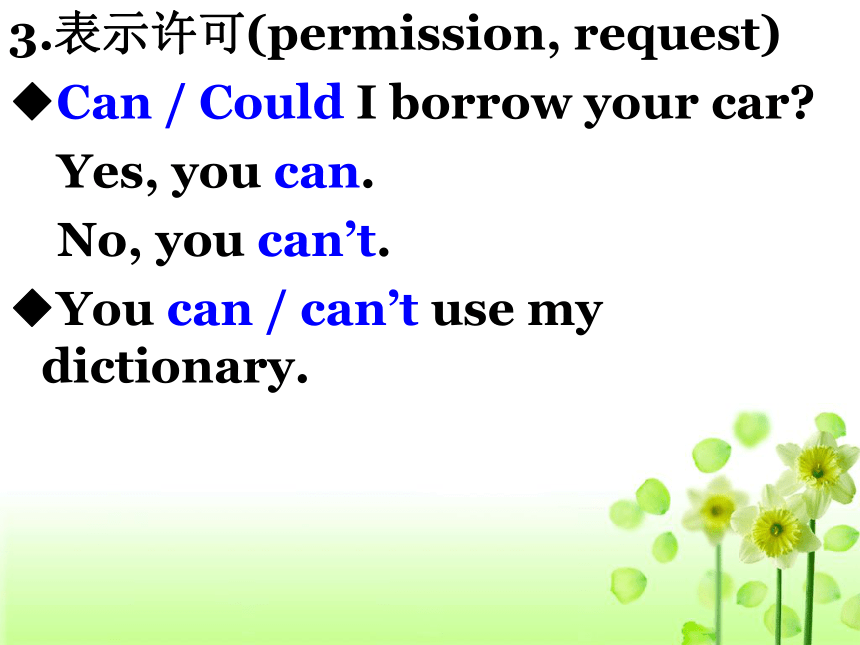

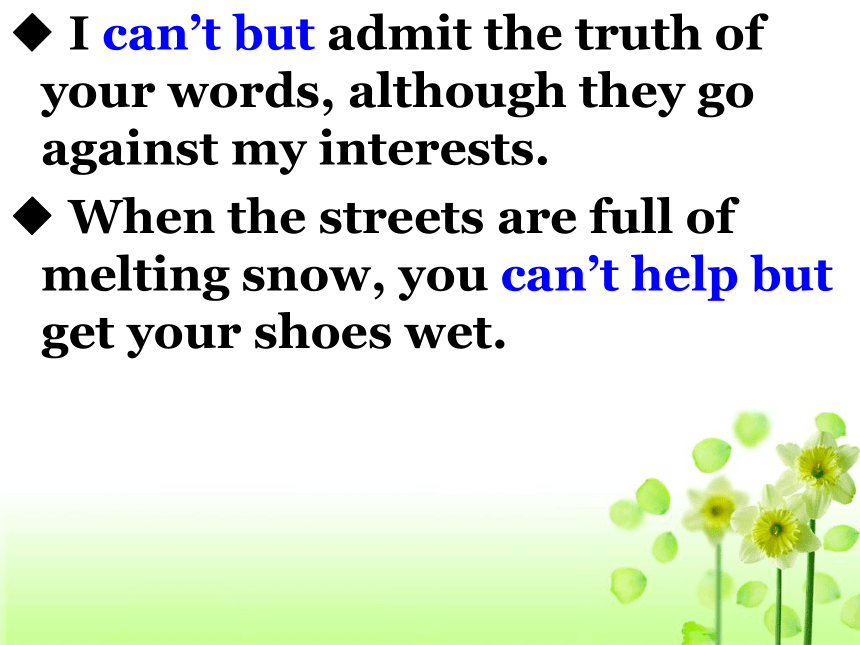
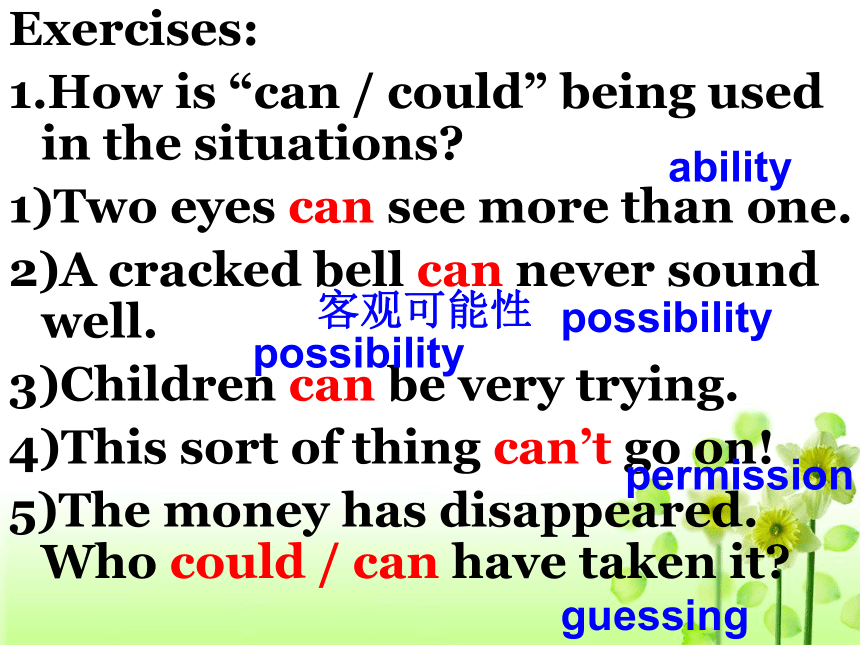
文档简介
课件45张PPT。modal
情态动词can / could
1.表示能力(ability) = be able to能够
1)Man can’t live without air.
Man isn’t able to live without air.
2)A computer can’t think for itself; it must be told what to do.
3)I’m starving to death. I can eat two bowls of rice now.
4)If you have a good sleep, you’ll be able to work out this problem.5) She could sing like an angel when she was a child.
= was able to
表示过去有能力并且成功地做了某事不能有could, 只能用 was / were able to
was/were able to
= managed to do
= succeeded in doing The fire spread through the fire quickly but everyone was able to get out.
=…managed to get out
=…succeeded in getting out2.表示可能性(possibility):可能
1)表示“偶尔的可能”,肯定句
◆She can be really stubborn at times.
◆ It can be pretty cold here, even in spring.2)“理论上的可能”、“客观上的可能”,不是说话者主观认为可能,否定can’t
◆ He hasn’t eaten for hours. He can be hungry.
◆ One of the few things you can say about English people with certainty is that they talk a lot about the weather.3)表示猜测(guessing),主观上的可能
猜测现在时
肯定句 could√ can X
否、? could√ can √
◆I don’t know his age. He could be thirty or thirty-five.
◆Couldn’t / Can the news be true?
◆What on earth can he be doing?
◆If he said that, he can’t be telling the truth. 猜测过去 can / could have done
◆The streets are all dry. It couldn’t have rained during the night.
◆Could he have known the news?
could have done 还可表示“过去有可能做却没有做”,虚拟语气
◆You could have done it better.
◆Thank you for all your hard work last week. I don’t think we could have managed it without you. 3.表示许可(permission, request)
◆Can / Could I borrow your car?
Yes, you can.
No, you can’t.
◆You can / can’t use my dictionary.4.phrases:
cannot / could not (help) but
不能不
◆ When the country calls you for help, you cannot but go.
◆ We couldn’t but weep at the sad news.
◆ I can’t but admit the truth of your words, although they go against my interests.
◆ When the streets are full of melting snow, you can’t help but get your shoes wet.
Exercises:
1.How is “can / could” being used in the situations?
1)Two eyes can see more than one.
2)A cracked bell can never sound well.
3)Children can be very trying.
4)This sort of thing can’t go on!
5)The money has disappeared. Who could / can have taken it?abilitypossibilitypossibilitypermissionguessing客观可能性6)One of the few things you can say about English people with certainty is that they talk a lot about the weather.
7)You could have set aside some time to spend with your son.
8)They can’t have gone out because the light’s on!possibility客观可能性guessing对过去的猜测2. Correct the mistakes.
1)The fire spread through the fire quickly but everyone could get out.
2)One of the few things you should say about English people with certainty is that they talk a lot about the weather.
3) She must be really cold at times.was able tocancan4)He hasn’t arrived at the meeting. What may have happened to him?
5)He can be 35 or 40.
6)When the streets are full of water, you can’t help but to get your shoes wet.
7)No dout her husband can have told her, but he didn’t choose to.cancouldcouldMay / might
1.表示允许 permission
1)Dogs may not be taken into the museum.
2)You may take either of the two.
3)You may do exactly as you like.◆May / Might I …?
1) Yes, you may.
Of course.
Yes, please do.
Delighted…
2) No, please don’t.
No, you may not.
I’d rather you didn’t.
I’m afraid not.2.表示可能性,推测:可能
1)对现在的推测:may / might + 动原,多用于肯、否句
◆He may be busy now.
◆It may be a new species.
2).对现在进行推测:
may / might be doing
◆They may be wanting to know when I arrive.
◆He might be working in the office.3)对过去的推测
may / might have done
◆He looks unhappy. He _______ ______________ in the exam. (fail)
◆I was careful not to look at him. He ____________________ the surprise in my face. (seen) may / might have failed may / might have seen3. might have done “本来可能做却没做……”, 不可以用may
1)He might have given you more help, even though he was very busy.
2)You shouldn’t have swum in that river. You _____________ __________ by fish. (eat)
3)You _______________ him help, though you were busy. (give) might have been eatenmight have givenNotice:
may / might not 可能不(语气不肯定)
can / could not 不可能(语气肯定)
1. He may not be ill.
他可能没病。
2. He can not be ill.
他不可能有病。4.表示祝愿:may 不可以换为might, 并且谓语动词永远用原形。
1)May you be happy!
2)May you have a long and happy life.
3)May there never be another world war.
4)May God bless you.
5)May all your dreams come true.5.phrases:
1) may well 很可能
◆His appearance has changed so much that you may well not recognize him.
◆Liza may well not want to go on the trip – she hates travelling.
2) may / might as well 不妨,可以
◆I needn’t wait. I may as well tell you now.
◆I expect I might as well be going.Shall
用于第一人称(单纯的将来, 美:will):将要,会
1)I shall be very happy to see you again.
2)By the end of this year, I shall have been working here for 20 years.2. 用于一、三人称(征求对方建议:第二人称用will):……好吗?要不要……?
1)Shall she come to help you?
2)Shall those goods be sent to you?
★ Will you please go to the museum with me?3.二、三人称陈述句(表说话者的意图intention, 允许permission, 告诫warning, 威胁threat, 命令order, 决心determination, 预言prediction,承诺promise 等)一定会,应该,可以要,给,得
1)It shall be done as you wish.
2)They shall suffer for this; they shall pay what they have done.
intentionthreat3)He shall do as I order.
4)If you work well, you shall have higher wages.
5)If you won’t do as I tell you, you shan’t go to the party.
6)Heaven and earth shall pass away, but not my word.
7)He is determined that you shall succeed.orderpromisewarningpredictiondetermination4.二、三人称陈述句(表强烈意志和不可避免性)一定
1.We shall defend the island, whatever the cost may be.
2.We shall have to be ready.
3.Those who can lose shall gain; those who wish for gain shall lose.强烈意志强烈意志不可避免性5.第三人称(在条约、规章、法令等文件中表义务或规定)必须,应
1)Persons under 18 shall not be employed in night work.
2)The new regulation shall take effect on June 1st.
3)Each party shall respect the conditions of this contract.
4)Candidates shall remain in their seats until all the papers have been collected.规定规章条约规定Should, ought to
1.(shall的过去式)将
1)We thought that we should never see you again.
2)We hoped that we should have confidence in each other again.
3)The weather report said that we should have rain tonight.2.(表示义务、责任、劝告、建议)应该
☆should have done (含责备之意)本应该做却没有做
Children should be devoted to their parents.
You shouldn’t be so careless.
I think you should get touch with your lawyer.
You should have told me the news earlier, but you didn’t.3.(表可能性、推测)应该、可能
1)The report is written after careful investigation, so it should be reliable.
2)They should have arrived in Beijing by this time.
4.万一(表语气较强的假设,用于if 引导的条件从句中)
1)If he (should) fail to come, ask Jack to work in his place.
2)Should it rain tomorrow the meeting would be postponed.5.虚拟语气
I / U drop caps.
insist, urge, demand, decide, request, require, order, command, advise, prefer, propose, suggest
1)我向他建议我立刻走。
I suggested to him that __________ ___________.
2)我们决定马上开始大扫除。
It was decided that _____________ ________________. I (should) go at once we (should) start a clear-up at once3)老师要求学生再加注意细节。
The teacher requested that _____ ___________________________ ________________.
4).他坚决要求好好照顾她。
He insisted she ________________.
5)建议这件事情在下次会议中考虑。
It was proposed that this matter __ __________ at the next meeting. the students (should) pay more to attention to detailsbe taken good care of be consideredmust, have to
must 主观 have to 客观
1.表示必要性(necessity):一定要,必须
You must have a passport if you want to travel abroad.
We must think about this very seriously.
2.表示说话者的命令或强烈劝告。
You must stop smoking and drinking.
1)mustn’t “禁止”
You mustn’t smoke here.
2)Must I clean all the windows?
Yes, you must.
No, you needn’t./
No, you don’t have to.3.must表示肯定的推测,否定:can’t
1) must do (对现在情况推测) → can’t do
He must be in the classroom now.
2) must be doing → can’t be doing
He must be sleeping, isn’t he?
He can’t be playing football.
3) must have done (对过去情况推测) → can’t have done
You’re on time. You must have got up early this morning. The husband thought his wife must have been looking forward to his return.
4)表示推测的must 只用于肯定句
疑:can, 否:can’t
--- Can it be the headmaster?
--- No, it can’t be the head master. He has gone to Shanghai.4.表示主语的固执:偏要,硬要
1)Must you worry her with questions just when she’s cooking dinner?
2)As I was to go to bed, the telephone must ring.
3)Of course, after I gave her my advice, she must go and do the opposite.Exx:
1. 1) We must think about this very seriously.
2) You must finish your homework on time.
3) The husband thought his wife must have been looking forward to his return.
4) Must you worry her with questions just when she’s cooking dinner?Will, would
1.(单纯的将来)将要,会
1)It looks as if he won’t be in time for the train.
2)She didn’t know when she would be seeing him again.
2.(在疑问句第二人称中,表示询问对方的意愿或向对方提出请求)… 好吗?要不要…?
Will / Would you please pass him the book?3.(表示意愿,意志,will 现在时,would 过去式)会、要
1) If you won’t do as I tell you, you shan’t go to the party.
2) They said they would help me.
3) I’ll go to see my sister. She’s in hospital.
4.(表示习惯性、经常性的动作)总是、惯于
1)Some birds will fly away to the south when weather turns cold.
2)He would sit there for hours, doing nothing at all.5.能、行(表功能)
1) This tree will live without water for three months.
2) The door won’t open.
3) This will do if there’s nothing better.
6. (表示事物的属性)
1) A moving object will not stop unless acted on by an outside force.
2)Oil will float on water.7.(用在虚拟语气中)
It looks as if he ____________ for another century. (活)
8.(对过去事情的猜测)想必、大概
1)It would be 1932, the year when you went to Europe.
2)I would be 8 when I first wanted to be a teacher.
3)--- Your language teacher looks a rather kind woman.
--- But in fact she is cold and hard on us. You ______ believe it.could/ would live wouldn’tThank you!
Good bye!
情态动词can / could
1.表示能力(ability) = be able to能够
1)Man can’t live without air.
Man isn’t able to live without air.
2)A computer can’t think for itself; it must be told what to do.
3)I’m starving to death. I can eat two bowls of rice now.
4)If you have a good sleep, you’ll be able to work out this problem.5) She could sing like an angel when she was a child.
= was able to
表示过去有能力并且成功地做了某事不能有could, 只能用 was / were able to
was/were able to
= managed to do
= succeeded in doing The fire spread through the fire quickly but everyone was able to get out.
=…managed to get out
=…succeeded in getting out2.表示可能性(possibility):可能
1)表示“偶尔的可能”,肯定句
◆She can be really stubborn at times.
◆ It can be pretty cold here, even in spring.2)“理论上的可能”、“客观上的可能”,不是说话者主观认为可能,否定can’t
◆ He hasn’t eaten for hours. He can be hungry.
◆ One of the few things you can say about English people with certainty is that they talk a lot about the weather.3)表示猜测(guessing),主观上的可能
猜测现在时
肯定句 could√ can X
否、? could√ can √
◆I don’t know his age. He could be thirty or thirty-five.
◆Couldn’t / Can the news be true?
◆What on earth can he be doing?
◆If he said that, he can’t be telling the truth. 猜测过去 can / could have done
◆The streets are all dry. It couldn’t have rained during the night.
◆Could he have known the news?
could have done 还可表示“过去有可能做却没有做”,虚拟语气
◆You could have done it better.
◆Thank you for all your hard work last week. I don’t think we could have managed it without you. 3.表示许可(permission, request)
◆Can / Could I borrow your car?
Yes, you can.
No, you can’t.
◆You can / can’t use my dictionary.4.phrases:
cannot / could not (help) but
不能不
◆ When the country calls you for help, you cannot but go.
◆ We couldn’t but weep at the sad news.
◆ I can’t but admit the truth of your words, although they go against my interests.
◆ When the streets are full of melting snow, you can’t help but get your shoes wet.
Exercises:
1.How is “can / could” being used in the situations?
1)Two eyes can see more than one.
2)A cracked bell can never sound well.
3)Children can be very trying.
4)This sort of thing can’t go on!
5)The money has disappeared. Who could / can have taken it?abilitypossibilitypossibilitypermissionguessing客观可能性6)One of the few things you can say about English people with certainty is that they talk a lot about the weather.
7)You could have set aside some time to spend with your son.
8)They can’t have gone out because the light’s on!possibility客观可能性guessing对过去的猜测2. Correct the mistakes.
1)The fire spread through the fire quickly but everyone could get out.
2)One of the few things you should say about English people with certainty is that they talk a lot about the weather.
3) She must be really cold at times.was able tocancan4)He hasn’t arrived at the meeting. What may have happened to him?
5)He can be 35 or 40.
6)When the streets are full of water, you can’t help but to get your shoes wet.
7)No dout her husband can have told her, but he didn’t choose to.cancouldcouldMay / might
1.表示允许 permission
1)Dogs may not be taken into the museum.
2)You may take either of the two.
3)You may do exactly as you like.◆May / Might I …?
1) Yes, you may.
Of course.
Yes, please do.
Delighted…
2) No, please don’t.
No, you may not.
I’d rather you didn’t.
I’m afraid not.2.表示可能性,推测:可能
1)对现在的推测:may / might + 动原,多用于肯、否句
◆He may be busy now.
◆It may be a new species.
2).对现在进行推测:
may / might be doing
◆They may be wanting to know when I arrive.
◆He might be working in the office.3)对过去的推测
may / might have done
◆He looks unhappy. He _______ ______________ in the exam. (fail)
◆I was careful not to look at him. He ____________________ the surprise in my face. (seen) may / might have failed may / might have seen3. might have done “本来可能做却没做……”, 不可以用may
1)He might have given you more help, even though he was very busy.
2)You shouldn’t have swum in that river. You _____________ __________ by fish. (eat)
3)You _______________ him help, though you were busy. (give) might have been eatenmight have givenNotice:
may / might not 可能不(语气不肯定)
can / could not 不可能(语气肯定)
1. He may not be ill.
他可能没病。
2. He can not be ill.
他不可能有病。4.表示祝愿:may 不可以换为might, 并且谓语动词永远用原形。
1)May you be happy!
2)May you have a long and happy life.
3)May there never be another world war.
4)May God bless you.
5)May all your dreams come true.5.phrases:
1) may well 很可能
◆His appearance has changed so much that you may well not recognize him.
◆Liza may well not want to go on the trip – she hates travelling.
2) may / might as well 不妨,可以
◆I needn’t wait. I may as well tell you now.
◆I expect I might as well be going.Shall
用于第一人称(单纯的将来, 美:will):将要,会
1)I shall be very happy to see you again.
2)By the end of this year, I shall have been working here for 20 years.2. 用于一、三人称(征求对方建议:第二人称用will):……好吗?要不要……?
1)Shall she come to help you?
2)Shall those goods be sent to you?
★ Will you please go to the museum with me?3.二、三人称陈述句(表说话者的意图intention, 允许permission, 告诫warning, 威胁threat, 命令order, 决心determination, 预言prediction,承诺promise 等)一定会,应该,可以要,给,得
1)It shall be done as you wish.
2)They shall suffer for this; they shall pay what they have done.
intentionthreat3)He shall do as I order.
4)If you work well, you shall have higher wages.
5)If you won’t do as I tell you, you shan’t go to the party.
6)Heaven and earth shall pass away, but not my word.
7)He is determined that you shall succeed.orderpromisewarningpredictiondetermination4.二、三人称陈述句(表强烈意志和不可避免性)一定
1.We shall defend the island, whatever the cost may be.
2.We shall have to be ready.
3.Those who can lose shall gain; those who wish for gain shall lose.强烈意志强烈意志不可避免性5.第三人称(在条约、规章、法令等文件中表义务或规定)必须,应
1)Persons under 18 shall not be employed in night work.
2)The new regulation shall take effect on June 1st.
3)Each party shall respect the conditions of this contract.
4)Candidates shall remain in their seats until all the papers have been collected.规定规章条约规定Should, ought to
1.(shall的过去式)将
1)We thought that we should never see you again.
2)We hoped that we should have confidence in each other again.
3)The weather report said that we should have rain tonight.2.(表示义务、责任、劝告、建议)应该
☆should have done (含责备之意)本应该做却没有做
Children should be devoted to their parents.
You shouldn’t be so careless.
I think you should get touch with your lawyer.
You should have told me the news earlier, but you didn’t.3.(表可能性、推测)应该、可能
1)The report is written after careful investigation, so it should be reliable.
2)They should have arrived in Beijing by this time.
4.万一(表语气较强的假设,用于if 引导的条件从句中)
1)If he (should) fail to come, ask Jack to work in his place.
2)Should it rain tomorrow the meeting would be postponed.5.虚拟语气
I / U drop caps.
insist, urge, demand, decide, request, require, order, command, advise, prefer, propose, suggest
1)我向他建议我立刻走。
I suggested to him that __________ ___________.
2)我们决定马上开始大扫除。
It was decided that _____________ ________________. I (should) go at once we (should) start a clear-up at once3)老师要求学生再加注意细节。
The teacher requested that _____ ___________________________ ________________.
4).他坚决要求好好照顾她。
He insisted she ________________.
5)建议这件事情在下次会议中考虑。
It was proposed that this matter __ __________ at the next meeting. the students (should) pay more to attention to detailsbe taken good care of be consideredmust, have to
must 主观 have to 客观
1.表示必要性(necessity):一定要,必须
You must have a passport if you want to travel abroad.
We must think about this very seriously.
2.表示说话者的命令或强烈劝告。
You must stop smoking and drinking.
1)mustn’t “禁止”
You mustn’t smoke here.
2)Must I clean all the windows?
Yes, you must.
No, you needn’t./
No, you don’t have to.3.must表示肯定的推测,否定:can’t
1) must do (对现在情况推测) → can’t do
He must be in the classroom now.
2) must be doing → can’t be doing
He must be sleeping, isn’t he?
He can’t be playing football.
3) must have done (对过去情况推测) → can’t have done
You’re on time. You must have got up early this morning. The husband thought his wife must have been looking forward to his return.
4)表示推测的must 只用于肯定句
疑:can, 否:can’t
--- Can it be the headmaster?
--- No, it can’t be the head master. He has gone to Shanghai.4.表示主语的固执:偏要,硬要
1)Must you worry her with questions just when she’s cooking dinner?
2)As I was to go to bed, the telephone must ring.
3)Of course, after I gave her my advice, she must go and do the opposite.Exx:
1. 1) We must think about this very seriously.
2) You must finish your homework on time.
3) The husband thought his wife must have been looking forward to his return.
4) Must you worry her with questions just when she’s cooking dinner?Will, would
1.(单纯的将来)将要,会
1)It looks as if he won’t be in time for the train.
2)She didn’t know when she would be seeing him again.
2.(在疑问句第二人称中,表示询问对方的意愿或向对方提出请求)… 好吗?要不要…?
Will / Would you please pass him the book?3.(表示意愿,意志,will 现在时,would 过去式)会、要
1) If you won’t do as I tell you, you shan’t go to the party.
2) They said they would help me.
3) I’ll go to see my sister. She’s in hospital.
4.(表示习惯性、经常性的动作)总是、惯于
1)Some birds will fly away to the south when weather turns cold.
2)He would sit there for hours, doing nothing at all.5.能、行(表功能)
1) This tree will live without water for three months.
2) The door won’t open.
3) This will do if there’s nothing better.
6. (表示事物的属性)
1) A moving object will not stop unless acted on by an outside force.
2)Oil will float on water.7.(用在虚拟语气中)
It looks as if he ____________ for another century. (活)
8.(对过去事情的猜测)想必、大概
1)It would be 1932, the year when you went to Europe.
2)I would be 8 when I first wanted to be a teacher.
3)--- Your language teacher looks a rather kind woman.
--- But in fact she is cold and hard on us. You ______ believe it.could/ would live wouldn’tThank you!
Good bye!
